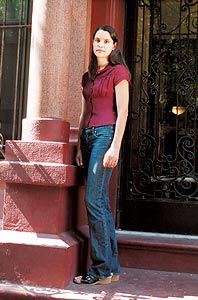
Much of Nell Freudenberger’s first novel was written in a yurt. Not a real yurt, mind you: Though she spent time abroad while researching The Dissident, the story of a Chinese performance artist in Beverly Hills, her nomadic tent was in fact a deluxe American contraption located in a vacation enclave. “It’s basically East Hampton,” Freudenberger explains, a little embarrassed.
An adventurous polyglot whose first short-story collection, Lucky Girls, drew on her own travels to Thailand and India, Freudenberger writes from an enviable—and famously envied—position in the center of the literary elite. Five years ago, the Harvard grad was a New Yorker editorial assistant, until former fiction editor Bill Buford ran her story “Lucky Girls,” the “one story that I thought was worth showing to anyone in my life,” in the Summer Fiction issue, alongside a glamour shot of Freudenberger lounging on red velvet. Beautiful, poised, and, sure, a good writer, too, she was ripe for the inevitable bidding war—and the inevitable backlash. They even coined a term for it: Schadenfreudenberger.
“The time when my lifelong dream came true sort of sucked,” says Freudenberger now, sipping an iced tea. “People were saying, ‘She only got the story published because she worked there.’ And I thought, Maybe they’re right.” She declined a $500,000 two-book deal in favor of a mere $100,000 with Ecco Press: “Even the thought of writing one book was scary at the time.”
Detractors can be forgiven for thinking, Oh, poor thing. But Freudenberger has moved on, channeling her wanderlust and her imposter anxiety into her protagonist, Yuan Zhao, a Chinese performance artist who may not be quite the rebel he claims to be. The character is based on a figure from Freudenberger’s youth: When she was in high school in California, she was taught by a visiting Chinese artist who overstayed his term, prompting whispers that he was trying to defect. “That seemed a very romantic idea to me, that someone could exit their country through the Marlborough School.” In retrospect, “He probably just wanted to do some more shopping.”
In person, Freudenberger is shy and circumspect, though she brightens when talking about the origins of her character’s artistic life. “I don’t know if you’re interested,” she says faintly, opening a catalogue for an ICP exhibit on the real-life Chinese artists’ colony where part of her novel is set: photographs of androgynous nude Chinese artists cooking fish, walking along the Great Wall, and covering themselves in oil and honey in rancid public bathrooms. It was the nudist fish-cooking that alerted the government to the performance artists outrageous work and thus led to the creative community’s destruction (it’s now an ultramodern hotel district).
Freudenberger, now 30 and comfortably settled in New York, is planning a September wedding to a young architect. But soon she’ll leave her new husband for a month to journey to Pakistan, which should provide raw material for another novel—a mere “constellation of thoughts” at the moment. One thing she won’t do for a long time is set a book in New York. Asked about life in the bustling metropolis, she mentions yoga and a pigeon’s nest outside her window. “There’s not a lot of drama here,” she says.
— The Dissident, By Nell Freudenberger, Ecco; August 15 ($25.95). Next: Weighing In on The Illustrated 9/11 Report
